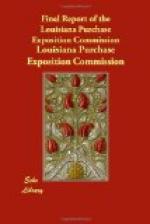and determined American settlers who demanded an outlet
of trade to the sea, but also because it provided
homes and means of livelihood for the millions
of new Americans whose coming tread fell upon
the ears of the expectant fathers of the Republic,
and whose stout hearts and brawny arms wrought the
miracles which our celebration should interpret.
We are here at this hour to dedicate beautiful and stately edifices to the purposes of our commemoration, but as we do this let us remember that the soil whereon we stand was a century ago dedicated to the genius of American industry and thrift. For every reason, nothing could be more appropriate as an important part of the centennial commemoration we have undertaken than the gathering together on this spot of the things that are characteristic of American effort and which tell the story of American achievement; and how happily will this be supplemented and crowned by the generous, magnanimous, and instructive contributions from other and older lands, which, standing side by side with our exhibits, shall manifest the high and friendly regard our Republic has gained among the governments of the earth, and shall demonstrate how greatly advancing civilization has fostered and stimulated the brotherhood of nations.
I can not, however, rid myself of the feeling that the inspiration and value attending such an exposition may be anticipated and increased if on this dedicatory occasion we promote appropriate reflections by a retrospection of some of the incidents which accompanied the event we celebrate.
We all know that long before the negotiations of the treaty of 1803 our Government had a keen appreciation of the importance to American settlers in the valley of the Mississippi of an arrangement permitting their products to be deposited and exported at the entrance of that river to the sea. It will be remembered that this need of our settlers had been met in a limited and not altogether secure manner by a treaty with Spain, allowing such deposits and exports to be made at the city of New Orleans. This privilege was entirely withdrawn in October, 1792, the territory appurtenant to such privilege having been in the meantime transferred to France. The situation thus created was extremely delicate. There was presented to the Government on the one hand the injury to western settlers through the loss of their trading outlet, and on the other the perplexing question of affording them relief by means of diplomatic agreement, or in some other method. The abandonment of our settlers to their disheartening fate was of course not contemplated.
It can not be denied that the conditions plainly pointed to cautious and deliberate negotiations as the way of prudence and safety. It very soon became apparent, however, that delay and too much deliberation did not suit the temper and spirit of sturdy Americans chafing under a sense of wrong




